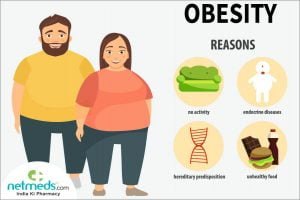Obesity
 Obesity is a medical problem caused by excessive body fat, which also increases the risks of getting other complicated diseases such as heart disease, high blood pressure, diabetes, and certain cancer diseases. It has become one of the leading health problems and the most neglected by people. There are many reasons why people have a problem with losing weight.
Obesity is a medical problem caused by excessive body fat, which also increases the risks of getting other complicated diseases such as heart disease, high blood pressure, diabetes, and certain cancer diseases. It has become one of the leading health problems and the most neglected by people. There are many reasons why people have a problem with losing weight.
Usually, obesity to some people is inherited from parents affecting the amount of body fat one stores in their body and how the fat is distributed. Environmental and physiological factors, physical activities combined with poor diet can also lead to obesity (Chuang, Chiu, Lee, Liu, Tsao, et al., 2016). Eating diets rich in vegetables and fruits can reduce obesity risks compared to least pro-vegetarian people who consume foods rich in animal foods like meat and eggs. Plant-based diets are associated with reduced body fats and weight, which is an intervention to obesity.
In most cases, obesity is caused by taking in more calories than one can burn through physical activities and exercise, which are stored in the body as fats. Those calories are caused by consuming unhealthy diets, which are more non-vegetarian products, including fast foods and meat. Also, liquid calories are caused by high-calorie drinks like alcohol and soft drinks, which add many calories to the body.
Diets rich in vegetables can help weight loss because they focus on foods with low-calories like fruits, vegetables, nuts, whole grains, seeds, soy, and nutrient-dense. However, being a vegetarian does not mean consuming fewer calories as some vegetables like soy cheese, snack bars, cookies, and pie contain many calories. In simple form, people should watch more on what they consume, and do exercise. There has been a drastic increase in people suffering from obesity and obesity-related diseases in the last couple of decades, and that’s why states, communities, and the federal government is putting emphasis on people consumption healthier food and doing a lot of exercises.

Vegetarians reduce the chances of being obese by bringing different benefits to the body, including weight loss. Switching to a diet rich in vegetables helps people lose weight as they don’t consume many calories. It also lowers the level of cholesterol in the body as vegetables are easily absorbed. Foods rich in vegetables help people not only from getting obese but lowers the chances of getting cancer diseases; research shows that people who consume vegetable foods have lower chances of getting cancer than non-vegetarian people.
It is true, people who base much on vegetable foods have lower chances of getting obese. However, alongside vegetarian foods, people should also get the right number of calories from the food, focusing on various fruits, vegetables, and whole grains. Also, limit processed foods and alcohol intake, avoid added sugars and unhealthful fats, and participate in an overall healthful lifestyle.
References
According to Chuang, S. Y., Chiu, T. H., Lee, C. Y., Liu, T. T., Tsao, C. K., Hsiung, C. A., & Chiu, Y. F. (2016) argues that vegetarian diet reduces the risk of hypertension independent of abdominal obesity and inflammation: a prospective study. Journal of hypertension, 34(11), 2164-2171.

